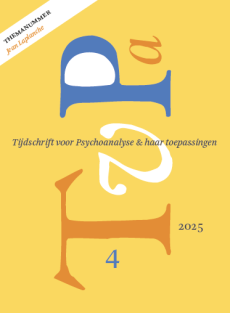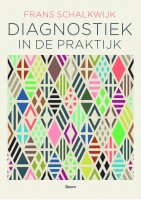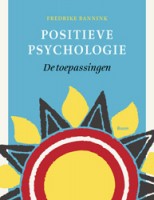Op schoot en eraf
Summary
In this paper several aspects of the concept of ‘distance’ are discussed. Comparison with the separation/individuation phase of normal development is used to focus on the goal of psychoanalytic treatment and the problems of distance in the clinical situation. Some ideas about the degrees of professional acceptance of (‘distance from’) new discoveries and of new developments in theory and technique are offered.
Literatuur
- Cavell, M. (1998), In response to Owen Renik’s ‘The Analyst’s Subjectivity and The Analyst’s Objectivity’, International Journal of Psycho-Analysis 79 (6), p. 1195-1203.
- De Rijck, A. (1998), Twee hernieuwers: reconstructie (Kohut) versus ontwikkelingsobservatie (Mahler). Bespreking van S. Kramer & S. Akhtar (1995), Mahler and Kohut. ‘Perspectives on Development, Psychopathology and Technique’. Tijdschrift voor Psychoanalyse 4, p. 241-244.
- Gerson, S. (1996), Neutrality, Resistance and Self-Disclosure in an Intersubjective Psychoanalysis. Psychoanalytic Dialogues 6 (5), p. 623-645.
- Hurst, D.M. (1996), Abstinence and Interaction. Psychoanalytic Inquiry 16 (1), p. 78-81.
- Lindon, J.A. (1994), Gratification and provision in Psychoanalysis. Psychoanalytic Dialogues 4 (4), p. 549-582.
- Moran, G. (1987), Some functions of play and playfulness: a developmental perspective, Psychoanalytic Study of the Child 42, p. 11-31.
- Orange, D.M., G.E. Atwood, R.D. Stolorow (1997), Working Intersubjectively. Contextualism in Psychoanalytic Practice, The Analytic Press, Hillsdale NJ.
- Poland, W.S. (1975), Tact as a psychoanalytic function. International Journal of Psycho-Analysis 56, p. 155-162.
- Poland, W.S. (1984), On the Analyst’s Neutrality. Journal of the American Psychoanalytic Association 32, p. 283-300.
- Renik, O. (1995), The ideal of the anonymous analyst and the problem of self-disclosure. Psychoanalytic Quarterly 64, p. 466-495.
- Renik, O. (1998), The Analyst’s Subjectivity and The Analyst’s Objectivity. International Journal of Psycho-Analysis 79 (3), p. 487-499.
- Rangell, L. (1997), At Century’s End: A Unitary Theory of Psychoanalysis. Journal of Clinical Psychoanalysis 6 (4), p. 465-484.
- Schachter, J. (1994), Abstinence and Neutrality: Development and diverse Views. International Journal of Psycho-Analysis 75, p. 709-720.
- Williams, P. (1998), Internet site discussion of ‘The Analyst’s Subjectivity and The Analyst’s Objectivity’ by Owen Renik, International Journal of Psycho-Analysis 79 (6), p. 1263-1271.
- Wolf, E.S. (1992), On being a Scientist or a Healer: Reflections on Abstinence, Neutrality and Gratification. Annual of Psychoanalysis 20, p. 115-129.
 © 2009-2026 Uitgeverij Boom Amsterdam
© 2009-2026 Uitgeverij Boom Amsterdam
ISSN 1382-516x
De artikelen uit de (online)tijdschriften van Uitgeverij Boom zijn auteursrechtelijk beschermd. U kunt er natuurlijk uit citeren (voorzien van een bronvermelding) maar voor reproductie in welke vorm dan ook moet toestemming aan de uitgever worden gevraagd:
Behoudens de in of krachtens de Auteurswet van 1912 gestelde uitzonderingen mag niets uit deze uitgave worden verveelvoudigd, opgeslagen in een geautomatiseerd gegevensbestand, of openbaar gemaakt, in enige vorm of op enige wijze, hetzij elektronisch, mechanisch door fotokopieën, opnamen of enig andere manier, zonder voorafgaande schriftelijke toestemming van de uitgever.
Voor zover het maken van kopieën uit deze uitgave is toegestaan op grond van artikelen 16h t/m 16m Auteurswet 1912 jo. Besluit van 27 november 2002, Stb 575, dient men de daarvoor wettelijk verschuldigde vergoeding te voldoen aan de Stichting Reprorecht te Hoofddorp (postbus 3060, 2130 KB, www.reprorecht.nl) of contact op te nemen met de uitgever voor het treffen van een rechtstreekse regeling in de zin van art. 16l, vijfde lid, Auteurswet 1912.
Voor het overnemen van gedeelte(n) uit deze uitgave in bloemlezingen, readers en andere compilatiewerken (artikel 16, Auteurswet 1912) kan men zich wenden tot de Stichting PRO (Stichting Publicatie- en Reproductierechten, postbus 3060, 2130 KB Hoofddorp, www.cedar.nl/pro).
No part of this book may be reproduced in any way whatsoever without the written permission of the publisher.
Nieuwsbrief Boom Psychologie
Meld u nu aan en ontvang maandelijks de Boom Psychologie nieuwsbrief met aantrekkelijke aanbiedingen en de nieuwe uitgaven.
Aanmelden


